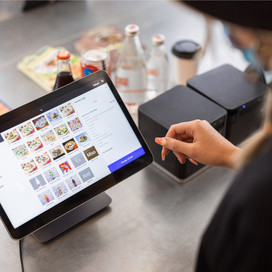Table of contents
The article below is only for informational purposes and doesn’t constitute financial, legal, or tax advice. For specific advice that applies to your business, contact a professional.
According to data from the Australian Bureau of Statistics, there are almost 2.5 million businesses actively trading in the Australian economy. Around 97% of these businesses have less than 20 staff, which adds up to a total of approximately 5 million workers employed by small businesses.
As such, it’s no exaggeration to say that small businesses are the lifeblood of our nation’s economy. And in order to keep the economy moving, small business owners need to maximise their profits and control their cash flow. That means having an understanding of all their financial matters including recording and categorising small business expenses for tax deductions.
What Are Business Expenses?
Any necessary and ordinary costs incurred for a business to operate and trade are what is business expenses. If a business is operating to make a profit, these expenditures can be deducted at tax time, reducing the overall amount of taxable income you’re required to pay tax on.
The following formula is used by the ATO in order to work out how much of income is your taxable:
Assessable Income – Tax Deductions = Taxable Income
The Assessable Income part of this equation is generally all of the gross pre-tax income earned from carrying out a business. It also includes all other forms of income from transactions intended to make a profit, such as capital gains, stock trading, crowdfunding, government payments, sharing economies, foreign income, and cryptocurrency investments.
Tax Deductions will be able to be claimed for most of the day to day costs incurred when running a business for profit, not including GST. The expenses of your small business need to be tracked and categorised in order to substantially increase savings.
Types Of Business Expenses
Business expenses are split into four main types of General, Operating, Capital, and Inventory. More information about each is below:
1. General Expenses
These are all general costs associated with managing and supervising your business. This includes expenditures for employing staff such as wages or salaries and super contributions.
2. Operating Expenses
This includes any of the necessary costs of running a business. Sometimes also known as revenue or working expenses, these include the costs of rent, utilities, marketing, maintenance, vehicles, and anything else required to operate the business.
3. Capital Expenses
Any assets purchased to make goods, provide services, or otherwise increase the growth or profits of a business are categorised as capital expenses. This includes the purchase price of equipment, machinery, and furniture, as well as cash, vehicles, patents, manuals, and real estate.
4. Inventory Expenses
These are any direct and indirect expenses associated with keeping inventory such as storage, taxes, insurance, and shortages.
The three main types of inventory are:
- Raw Materials
- Work-In-Progress
- Finished Goods
While business inventory isn’t tax deductible, it can be used as a reduction in the gross receipts. This is why the total value of all trading inventory must be accounted for at the end of each Financial year.
Deductible Business Expenses (Partially Or Fully Deductible)
When it comes to the general costs incurred when running your business, the good news is that the vast majority of expenses can be offset to reduce your taxable income. That being said, some exceptions are only eligible for a partial reduction, whereas others are excluded outright.
According to the ATO, business expenses can be claimed as tax deductions as long as:
- They are related directly to earning income for the business
- You keep records to substantiate your claims
- They are solely for the business and not private use*
*If an expense is for a mixture of both business and private use, only the portion used for business can be claimed.
Below is a list of categories most businesses can claim as deductible business expenses.
- Payroll, Salaries, & Employee Benefits
- Rent or Mortgage
- Utilities
- Maintenance & Repairs
- Cars & Other Motor Vehicle Expenses
- Communications, Internet & Cloud storage
- Inventory & Stock
- Licenses & Permits
- Legal, Accounting, & Professional Services
- Office Furniture, Equipment, & Supplies
- Marketing, Advertising, & Sponsorship
- Software & Subscription Services
- Insurance
- Business Travel & Accommodation
- Public relations
While this is not an exhaustive list, it should give you a good idea of where to start. Educating yourself about the most common expense categories for small businesses should make it much easier to determine what you can deduct at tax time.
Non-Deductible Expenses
While most small business expenses are considered tax deductions, not all of them are allowable.
Some small business expenses that cannot be used to reduce taxable income include political contributions or lobbying, social memberships, and obviously any illegal activities. Some of the most common non-deductible business expenses are:
- Fines or Penalties
- Expenses For Client Entertainment
- Gifts Not Connected to Earnings
- GST Component of Expenses
- Personal Expenses
Even though the expenses above have been paid for by the business, they’re considered to be non-deductible by the ATO.
Integrate Accounting Software With Square POS
As you can see, effective management of your small business expenses is extremely important as it can have a massive impact on the amount of tax you need to pay. Most modern bookkeeping programs like QuickBooks and Xero have numerous features to help with recording ‘what is business expense’, like cloud access, digital receipts, and expense categories. And if you’re using Square POS, you can integrate many of these external bookkeeping software packages and have access to a fully automated accounting system.
With an accurate, consistent, and up-to-date bookkeeping system at your fingertips, Square POS can help you account for all of your business expenses. This means you’ll have access to a well-organised list of business expenses which saves significant time when filing your taxes. Then all you’ll need to do is update the system with current documentation and data to ensure the total of your small business expenses is correct.
From robust integrations of accounting software to reliable tools for inventory management, Square POS can help you run your business smoothly and accurately.
![]()











